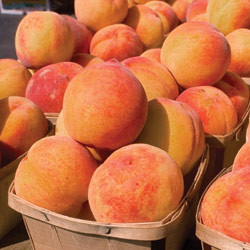
Lately it seems that more and more people are going natural. The organic section in traditional grocery stores continues to increase in size, and health food stores are gaining ground. Natural is in, and organic is hot, but just what exactly do all of these words mean, and does eating “naturally” really make you healthier?
Organic Standards
It is important to note that “natural” and “organic” are not the same thing. The main difference is that organic foods must adhere to standards set forth by the Organic Standards Board of the U.S. Department of Agriculture (USDA). There are no legal guidelines as to what constitutes a “natural” food.
Organic foods are classified by the methods used to produce the foods rather than the characteristics of the foods themselves. According to the USDA criteria, to be labeled organic, food must have been produced without the use of synthetic fertilizers and pesticides (with several exceptions), antibiotics, irradiation, genetic engineering or growth hormones. Products labeled as "100% organic" must contain only organically produced ingredients, while those labeled "organic" must consist of at least 95 percent organically-produced ingredients.
Whereas conventional farmers apply chemical fertilizers to promote plant growth, organic farmers apply natural fertilizers, such as manure or compost. Traditional farmers spray insecticides to reduce pests and disease and use chemical herbicides to manage weeds, while organic farmers use beneficial insects and birds or traps, and rotate crops, till, hand-weed or mulch. Finally, conventional farmers use antibiotics, growth hormones and medications, while organic farmers give animals organic feed, allow them time outside and employ preventive measures, such as rotational grazing, to encourage health and minimize diseases.
What is Natural?
Natural foods, on the other hand, are not measured against a defined benchmark, nor are they regulated by the Food and Drug Administration. There is no official definition of “natural” foods. Food companies can get away with using all sorts of non-natural processes and chemical ingredients in food products claimed to be “all natural.” Because of this, marketing terms like “all natural” and “100% natural” are often misleading and do not necessarily designate a healthy food.
In general, the term "natural" does indicate that a food has been minimally processed, less so than its “non-natural” counterparts. And while many natural foods are better for you than those not specified as such, they are not necessarily made from pesticide- or cruelty-free products unless they are labeled as organic. Natural foods can include organic foods, but not all natural foods are organic. And while foods found at natural food stores are usually truly “natural,” items in traditional stores that are labeled as such may not be.
Naturally Yours
Clearly, organic and (genuinely) natural foods are a great way to get healthy and improve your lifestyle. Roger Hutchinson, manager of Naturally Yours Grocery at Metro Centre, explained some of the reasons why they are here to stay.
The growth of disease in the United States can often be linked to the chemicals absorbed from processed foods. Naturally Yours Grocery items are free of antibiotics, pesticides, steroids and herbicides, so they help patrons stay “clean.” Studies have shown that organic foods have 40 percent more nutrients than traditional foods, and organic foods can even help customers lose weight. Because of these higher levels of nutrients, consumers can eat less and feel full faster.
And while many traditional grocers are losing profits in this down economy, natural food stores are seeing steady sales, even if growth has slowed. Despite the fact that natural and organic foods are often more expensive, sales remain strong because its buyers are loyal.
Your Best Bet
When buying “natural” foods, be wary of health claims on the fronts of packages—they are often not much more than marketing terms. Analyze the ingredients on the labels yourself. But your best bet is to buy organic. That way, you can be certain that the sources of your food are following strict rules with regard to their processes and facilities. And the food is simply better for you. iBi

